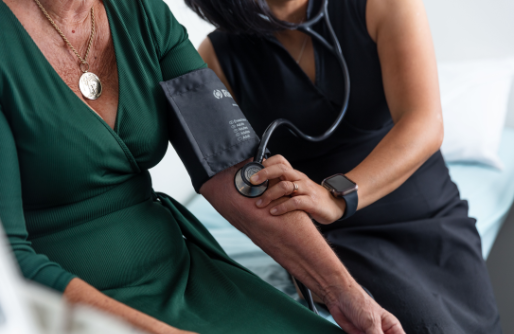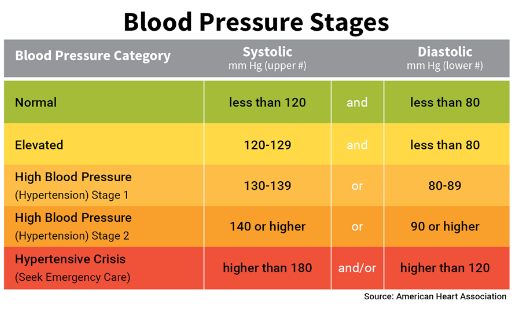Hypertension
Blood pressure is a measurement of the tension created on the walls of your arteries as your heart pumps blood around your body. Your blood pressure will go up and down naturally throughout the day depending on what you are doing, especially if you are doing physical activity, or on the other hand, sleeping.
Blood pressure is measured regularly as part of your cardiac care. The sphygmomanometer (blood pressure monitor) gives 2 blood pressure parameters:
- Systolic pressure: This is the top number of a blood pressure reading. This is a measurement of the pressure in your arteries as your heart pumps blood out.
- Diastolic pressure: This is the bottom number of a blood pressure reading. This is a measurement of the pressure in your arteries between each heartbeat.

High blood pressure (hypertension) is when your blood pressure remains higher than normal (generally blood pressure > 140/90). It is one of the main risk factors for heart disease, especially heart attacks and strokes. Unfortunately, hypertension can be left undiagnosed for years if you are not experiencing any symptoms. This makes it more important to maintain regular check-ups with your GP, and your heart specialist if required to maintain adequate blood pressure control and reduce your risk of serious health problems such as heart attack and stroke.
Most (>90%) of high blood pressure in the community arises de novo, ie. it is an “essential” hypertension. There are, however, some factors which can increase your likelihood of developing it:
- Family history
- Eating patterns (including salty foods)
- Alcohol intake
- Smoking
- Weight
- Physical activity and exercise levels
- Kidney problems
- Abnormal increase in hormones such as cortisol
- Medications such as some treatments for migraine
Your blood pressure can increase temporarily due to stress, your emotional state, recent physical activity, caffeine/alcohol consumption or even talking.
Treatment
A healthy lifestyle is not only important for overall wellbeing, but can also help to reduce blood pressure and reduce your reliance on medications. Some actions which may be recommended include:
- Reducing your salt intake and eating a heart-healthy diet.
- Regular exercise (generally half hour of moderate intensity exercise 5 days a week).
- Maintaining a healthy weight or losing weight if you are overweight or obese.
- Limiting alcohol intake.


